- Home
- Marilyn French
The Women's Room Page 4
The Women's Room Read online
Page 4
Now, in the past fifteen years she had lived on earth, Mira had been quite alone, had lived mostly in her head. She had despised the children she saw jumping rope or playing tag in the streets: she found their occupations stupid. She despised the empty boredom of adults’ lives, gathered mainly from occasions when the Wards entertained friends, and found their conversation stupid. She respected only two people: her English teacher, Mrs Sherman, and Friedrich Nietzsche. But of all the stupid creatures that lumbered around on earth, the most stupid were boys. They were loud, truculent, sloppy, dirty, silly, boisterous, and dumb at school. Everyone knew that. Whereas she was smart and clean and neat and precise and able and got A’s even without studying. All the girls had been smarter than the boys until the last few years when the girls had started to get silly, too. One by one, they had started to lick their lips all the time to make them shiny, only to end up with chappedness around their mouth. They would pinch their cheeks to make them pink. And smoke in the girls’ room, even though you got expelled from school for that. Girls who had been smart in sixth grade acted stupid in class in seventh and eighth. They walked in groups and talked in whispers and giggled. She couldn’t even find anyone to walk to school with. But now she discovered that if she didn’t want to act like them, she really wanted to know what it was they were whispering and giggling about. That her easy disdain for them should turn into a vulnerable curiosity outraged her.
And the boys! She would eye them furtively, having finished writing out her Latin declensions ten minutes before the rest of the class. She saw skinny necks, wetly plastered hair, pimply faces. They threw spitballs and made paper airplanes and never knew the answer when the teacher called on them. They giggled over nothing. And the girls would watch them, smiling and tittering, as if they were doing something clever. It was inexplicable, but no more so than the fact that if one of them looked right at her, she felt her heart start to pound and her face get red.
But there was another problem, even deeper because she understood it even less than she understood what was happening to her. It had to do with the transformation of boys to men. Because everybody despised boys, everyone looked down on them, the teachers, her mother, even her father. ‘Boys!’ they would exclaim in disgust. But everyone admired men. When the principal came into the classroom, the teachers (all women) got all fluttery and nervous and smiled a lot. It was like when the priest came into the room when she was taking religious instruction: the nuns bowed all the way down to the floor, as if he were a king, and they made the children stand up and say ‘Good afternoon, Father,’ as if he were really their father. And when Mr Ward came home from work, even though he was the gentlest man in the world, all Mrs Ward’s friends would scurry home, their cups of coffee still half full.
Boys were ridiculous, troublesome, always fighting and showing off and making noise, but men strode purposefully to the center of every stage and took up the whole surface of every scene. Why was that? She began to realize that something was awry in the world. Her mother was dominant at home; in school, the authorities had all been women except for the principal. But it was not so in the outside world. The stories in the newspaper were always about men, except once in a while when a woman got murdered, and there was Eleanor Roosevelt, but everyone made fun of her. Only the page that gave recipes and dress patterns was for women. When she listened to the radio, the programs were all about men, or else about boys like Jack Armstrong, and she hated all of those and would not eat Wheaties when her mother bought them. Jack, Doc, and Reggie did the exciting things, and the women were always faithful secretaries in love with their bosses, or they were beautiful heiresses needing to be rescued. It was all like Perseus and Andromeda, or Cinderella and the Prince. Of course it was true that there were also in the newspapers pictures of ladies in bathing suits being handed bunches of roses, and down at the Sunoco station there was a full-size cardboard poster of a lady in a bathing suit holding up a thing called a spark plug. The connection between these two puzzled her, and she pondered it long and often. Worst of all, she realized that her childhood notions, when she had read about and adored Bach and Mozart and Beethoven and Shakespeare and Thomas E. Dewey and thought that she would be like them, were somehow inappropriate.
She did not know how to deal with any of this, and her fear and her resentment brought out all her stubborn pride. She would never be anybody’s secretary, she would have her own adventures. She would never let anybody rescue her. She would never read the recipes and dress patterns, but only the news and the funnies. And no matter what went on in her head about boys, she would never let them know it. She would never lick her lips and pinch her cheeks and giggle and whisper like the other girls. She would never let a boy know she even looked at him. She would not let drop her suspicion that men were only grown-up boys who had learned some manners and were not to be trusted, being also members of the inferior gender. She would never marry, having seen enough in her parents’ friends to warn her off that state. And she would never, never look like those women she had seen walking around with their bodies all popping out and deformed. Never.
7
She turned to literature. She looked for books about adolescents, books she could find herself and her problems in. There were none. She read every thin, saccharine ‘girl’s book’ she could find, and gave up. She began to read trashy novels, anything she could find in the library that looked as if it were about women. She swallowed them whole. She read, without making distinctions among them, Jane Austen and Fanny Burney and George Eliot and Gothic novels of all sorts, Daphne du Maurier and Somerset Maugham and Frank Yerby and John O’Hara, along with hundreds of nameless mystery tales, love stories, and adventures. But nothing helped. Like the person who gets fat because they eat unnourishing foods and so is always hungry and so is always eating, she drowned in words that could teach her to swim. She had a perpetual headache: sometimes she felt she was reading to escape from life, for the escape, at least, occurred. Her head always felt the way it would, years later, when she had smoked three packs of cigarettes in a day. She begrudged going to school, and often claimed illness; she begrudged sitting at the dinner table without a book. She read on the toilet and in the bath; she read late into the night; and when her mother insisted she turn out the light, she read under the covers with a flashlight. She had begun to do babysitting, and would sneak around the houses she sat in, searching for books, books she might not be allowed to take from the library. She struck pay-dirt one night, finding Forever Amber, and reading it in Saturday-night installments, always careful to slide it back into the closed china closet when she heard the Evanses’ car come up the driveway. Finally, a friend at school lent her The Fountainhead. That was it. She nearly swooned with it. She read it twice, and when the girl asked her to return the book, Mira asked her mother to give it to her for Christmas.
Nevertheless, this reading she was so immersed in and that filled her entire mind for over a year was, in her own view, low. It felt like a kind of insanity to her, something she couldn’t help, but something that was not good. It swam in pinkish purple waters in the lower part of her brain, and she kept trying to lift herself out of it, to use the other part. Bored as she was doing the reading demanded in school – Silas Marner, Julius Caesar, The Autobiography of Lincoln Steffens – she realized that this reading was higher, whatever that meant. Good literature, what her teachers would call good literature, was not involved with the world. To be involved with the world is lower than not to be. The world is a cesspool, flesh is base, spirit and mind are exalted. A descent into the world of matter was like bathing a clean body in a muddy pool. It might perhaps be forgiven in the name of experience, but only if one learned from it and returned to the higher world. And it was clear that women never did this. Only the inferior sex did it. Oh, a few bad women did it too, but they never returned to the world of spirit and mind. Women were always pure and true and clean, like Cordelia and Marina and Jane Eyre. And they were always virgins, too, at least unt
il they got married. What could sex be like, that having it was enough to damn you forever to the cesspool? She wanted to be good and pure and true like them, but she didn’t want to have the bad things happen to her that happened to them. She would try not to descend to the cesspool, but on the other hand, she was sinking in it day by day. She found some girlfriends; she even found herself whispering and giggling with them. She did not know how it happened. For a while, she resisted the magazines they read but eventually borrowed and finally even bought them. Seventeen was full of advice to girls about clothes, hairdos, makeup, and boys.
They read The Taming of the Shrew in English class; she got The Fountainhead for Christmas, and read it again. She tried to read Nietzsche again and found that he said women were liars, calculating, out to dominate the male. He said you should take a whip when you go to woman. What did he mean? Her mother did dominate her father, but her mother was not a liar. Mira lied, but only to get out of going to school. Still, it was impossible not to respect Nietzsche; he was smarter than even the men teachers, much smarter than Mr Woodiefield, her father’s boss, who had come with his fat wife to dinner one night and Mira’s mother had said afterward how smart he was. But why should Nietzsche say carry a whip? Mira’s father liked her mother to dominate him. He liked her. Whenever he grumbled and grouched, it was at Mira, not at her mother. Kate was his dog, his horse, Petruchio said; the teacher said that was the way it used to be. But when they were at the Mittlows’ for dinner, fat gross Mr Mittlow would bark ‘Milk!’ at his wife, and even though she was just as tall as he and pretty fat herself, she would jump up from the table and run for a pitcher of milk. And sometimes they would hear screaming at night and Mrs Ward whispered to Mira that Mr Willis beat his wife. She also told her that the German butcher who lived across the street with only his daughter, would chain her to the bed when he wanted to go out drinking at night, and when he came back, he would beat her. Mira didn’t ask how her mother knew this.
And since she had begun to buy magazines, she let her eyes wander among them on the rack and she saw, even though she immediately averted her eyes, that a lot of them had pictures of women in black underwear on them, or women chained up and naked and a man standing over them with a whip. In the movies too, these things happened. Not just the ones at the Emporium, the theater she and her friends were not allowed to go to, although there were pictures like that in the cases outside, but even in regular movies, sometimes the hero would spank the heroine, who before that was fresh and talked back, like Mira herself. He would come bursting through a door and pull her over his knee and she would yell, but after that she would adore him, she would follow him with her eyes and obey him submissively, and you knew she loved him forever. It was called conquest and surrender, and a man did one and a woman did the other, and everybody knew it.
8
These things crept into her imagination as her hands crept about her body as she lay in bed: it was perhaps inevitable that there would be a meeting of elements. Her first experiments with what she did not know until years later was called masturbation were inept, but incredibly titillating. She was drawn to continue bravely in them, terrified about what she might be doing to her body, but charging boldly onward. And invariably her mind, as she probed and rubbed, was drawn to what she did not know until years later were called masochistic fantasies. She grasped at any material, and there was never a dearth. History lessons about the treatment of women in China, the laws of England before the twentieth century, or the customs of Moslem countries would provide her with weeks of new fantasies. Shakespeare’s Comedy of Errors, and plays of Romans, Greeks, and Englishmen offered visions of worlds where such things were permitted. And there were lots of movies like Gone With the Wind, or movies with Nazis invading a little town in the Netherlands and taking over the big houses in which lived the daughter of the man who owned it, or with mean men, like James Mason, threatening beautiful women. Even lesser scenes could serve to trigger the alert imagination.
She would choose a culture, a time and place, and embroider all the surroundings. At the center, there had to be a power struggle. Years later, when she finally encountered pornographia, she found it tedious and dull compared to her own brilliant fantasies with their stage sets, costumes, and the intense power struggle. She realized, after hundreds of hours of mind-wandering down the corridors of male cruelty toward women, that the essential ingredient of her titillation was humiliation, and for that, a power struggle was necessary. Her female characters might be noble and brave, spunky, tough, or helpless and passive but resentful, but they had to put up a fight. Her male characters were always the same, though: arrogant, convinced of male supremacy, and rule, but always intensely involved with the female. Her submission is the most important thing in the world to them, and worth any effort. Since he holds all the power, the only way she can defy him is to resist. Yet the moment of surrender itself, the instant of orgasm, always seemed to Mira a surrender of both characters. At that moment, all the fear and hate the female character felt turned to love and gratitude; and she knew that the male character must feel the same way. For that brief time, power was annulled and all was harmonized.
But if Mira fantasised masochistically, she did not act so. She recognized that there was a large difference between life and art. In the movies and in her fantasies, the things that were done to the heroine hurt but did not hurt. They left no scars. She felt no hatred for the hero afterward. But that was not so in life. In life such things would hurt and scar and build up incredible hatred. Mr Willis beat Mrs Willis, but she was so thin and frail and had teeth missing and hunched-over shoulders and she looked at her husband with blank eyes. Mira could not imagine Mr Willis who was also rather thin and frail and blank, acting like Rhett Butler. And both Mr and Mrs Mittlow were large and bossy. He had glasses and she had a broad stiff bosom and they lived in an immaculate house and talked about their neighbours and their automobile. Even if she jumped when he spoke, Mira could not imagine him chaining her up and torturing her.
It was sex itself, Mira decided, that was the humiliation. That was why she had such thoughts. Two years ago she had been her own person, her mind was her own, a clear clean space for the working out of clear, clean and interesting problems. Mathematics had been fun, an elaborate puzzle, and people had been unwelcome distractions from the play of mind. Suddenly her body had been invaded by a disgusting, smelly substance that brought pain to her lower half and anxiety to her mind. Could other people smell her? Her mother said she would have this the rest of her life, until she got old. The rest of her life! The blood caked on the napkin and chafed her. It smelled. She had to wrap it up in toilet paper – she used nearly a quarter of a roll – then carry it to her room and put it in a paper bag and later carry it downstairs and put it in the garbage. Five or six times a day for five or six days a month she had to do this. Her clean white smooth body had this inside it? Mrs Mittlow had said that women build poisons up in their bodies and they had to be gotten rid of. Women always whispered about it, for men, she understood, were not subject to such things. They did not have the same poisons in them, Mrs Mittlow said. Mira’s mother said, ‘Oh, Doris!’ but Mrs Mittlow was insistent. The priest had told her, she said. So men remained in charge of their bodies; they were not invaded by painful and disgusting and bloody events they could not control. That was the great secret, that was what boys knew and laughed at, that’s why they were always poking each other and looking at girls and laughing. That was why they were the conquerors. Women were victims by nature.
Bad enough the body, but even her mind was invaded by shadowy longing, yearnings as deep and vague that, as she sat on her bed near the window, she thought only death could fill them. She fell in love with Keats. Mathematics was no longer fun and she dropped out of calculus. Latin was all about men doing stupid things, so was history. Only English stayed interesting – there were women in it, blood, suffering. Still, she kept her pride. Part of her mind dropped out of the world, but her fe
elings were kept strictly private. Whatever she felt, she reasoned, at least she didn’t have to show it. She had been shy and withdrawn, but she became stiff, aloof, mechanical and rigid. Her posture and walk became stiff – her mother urged her to wear a girdle although she was slender, because her bottom might wiggle when she walked, and boys would see. Her demeanor towards boys was hostile, even furious. She hated them because they knew. She knew they knew and that they were not subject, they were free, and they laughed at her, at all women. The girls who laughed with them knew too but had no pride. It was because the boys were free that they ruled the world. They went about on motorcycles, they even had their own cars, they went out alone at night, and their bodies were free and clean and clear and their minds were their own, and she hated them. She whirled to attack if one of them even dared to speak to her. They might, at night, control her imagination, but she was damned if in the daytime they so much as touched it.
9
Gradually, as her body developed mature configurations, and boys began to cluster around her, Mira began to perceive that boys wanted girls as much as girls wanted them. She also heard some whispered stories about things called wet dreams. And if she still did not see males as being like her – but then she did not see females as being like her, either – at least they were not quite the terrifying strangers they had been. They too were subject to nature: that was some consolation. Their bodies too had changed: they were less skinny and pimply, and the smell of male cologne and hair cream reinforced her sense that they, like girls, cared about how they appeared. Perhaps some of their laughter had been out of embarrassment as severe as hers. Perhaps they did not look down on women as much as she thought. Perhaps.

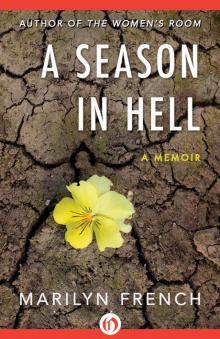 A Season in Hell
A Season in Hell My Summer With George
My Summer With George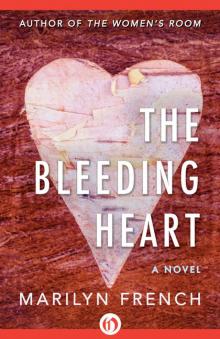 The Bleeding Heart
The Bleeding Heart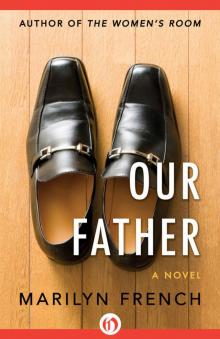 Our Father
Our Father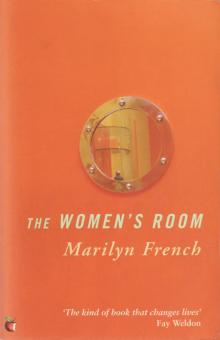 The Women's Room
The Women's Room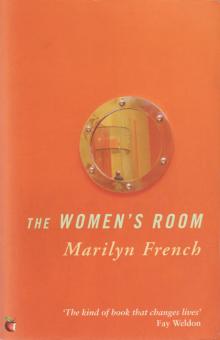 The Women's Room (Virago Modern Classics)
The Women's Room (Virago Modern Classics)